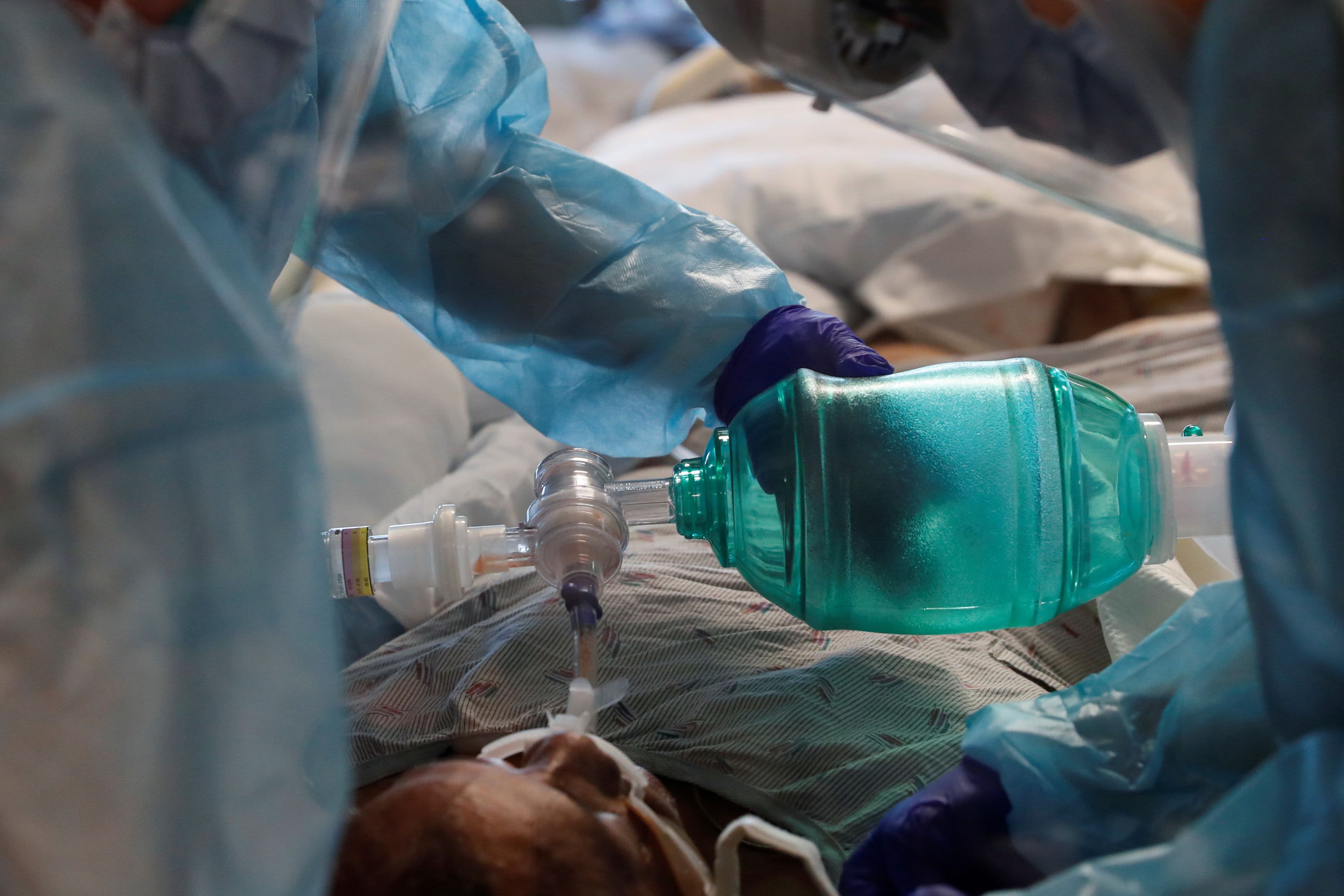Critical care workers insert an endotracheal tube into a coronavirus disease (COVID-19) positive patient in the intensive care unit (ICU) at Sarasota Memorial Hospital in Sarasota, Florida, February 11, 2021.
Shannon Stapleton | Reuters
Some Covid-19 patients are experiencing shortness of breath, fatigue, headaches and “brain fog” for months to nearly a year after their initial illness. Now, global medical experts are working to better diagnose and treat them for what they are tentatively calling “long Covid.”
Earlier this week, the World Health Organization hosted a global meeting with “patients, clinicians and other stakeholders” to advance the agency’s understanding of what’s medically referred to as post-Covid condition, also known as long Covid, WHO Director-General Tedros Adhanom Ghebreyesus said on Friday.
The gathering was the first of many to come. The goal will be to eventually create an “agreed clinical description” of the condition so doctors will be able to diagnose and effectively treat patients, he said. Given how many people have been infected with the virus globally — nearly 108 million people as of Friday — Tedros warned it’s likely many will experience these lingering symptoms.
“This illness affects patients with both severe and mild Covid-19,” Tedros said during a press briefing at the agency’s headquarters in Geneva. “Part of the challenge is that patients with long Covid could have a range of different symptoms that can be persistent or can come and go.”
Limited data
So far, there’s a limited number of studies that discern what the most common long-Covid symptoms are or how long they might last. Most of the focus has been on people with a severe or fatal illness, not those who have recovered but still report lingering side effects, sometimes referred to as “long haulers.”
Most Covid patients are thought to recover just weeks after their initial diagnosis, but some have experienced symptoms for six months, or even close to a year, medical experts say.
One of the largest global studies of long Covid published in early January found that many people suffering from ongoing illness after infection are unable to return to work at full capacity six months later. The study, which was published on MedRxiv and not peer-reviewed, surveyed more than 3,700 people ages 18 to 80 from 56 countries to identify the symptoms.
The most frequent symptoms experienced after six months were fatigue, tiredness after exercise and cognitive dysfunction, sometimes referred to as brain fog, the study found.
Is this unique to Covid-19?
“We really don’t know what’s causing these symptoms. That’s a major focus of the research right now,” Dr. Allison Navis, a professor at the Icahn School of Medicine at Mount Sinai, said during a call with the Infectious Diseases Society of America on Friday.
“There’s a question of whether this is something that’s unique to Covid itself — and it’s the Covid virus that’s triggering these symptoms — or if this could be part of a general post-viral syndrome,” Navis said, adding that medical experts see similar long-term symptoms after other viral infections.
Another study published in early January in the medical journal The Lancet studied 1,733 patients who were discharged from a hospital in Wuhan, China, between January and May of last year. Of those patients, 76% reported at least one symptom six months after their initial illness. The proportion was higher in women.
“We found that fatigue or muscle weakness, sleep difficulties, and anxiety or depression were common, even at 6 months after symptom onset,” researchers wrote in the study.
They noted that the symptoms reported months after someone’s Covid-19 diagnosis were consistent with data that was previously found in follow-up studies of Severe Acute Respiratory Syndrome, or SARS, which is also a coronavirus.
Post-Covid clinics come online
Some large medical centers are now creating post-Covid clinics to help care for patients with persistent symptoms. Navis said her clinic at Mount Sinai in New York City has treated a “fairly even” distribution of men and women experiencing lingering illness, and the average patient age is 40, she said.
Dr. Kathleen Bell, a professor at the University of Texas Southwestern Medical Center, said her hospital’s long-term Covid-19 clinic started last April as a wave of infections hit Italy and New York early in the pandemic.
Bell, speaking on the Infectious Diseases Society of America call Friday, said that a range of professionals are required to staff the clinics since the symptoms are uneven, including experts who can treat muscle weakness, heart-related illnesses and cognitive issues for those experiencing mental health problems after their diagnosis.
“It’s really, in many ways, forcing us all to get together and to make sure we have open lines of communication to be addressing all of these problems for patients,” Bell said.
Bell added that the Centers for Disease Control and Prevention hosted a call with long Covid centers across the country in January to discuss their model for treating patients.
“I do think that the CDC now is trying to pull centers together and get some some more firm guidelines for this, which is very exciting,” Bell said.
— CNBC’s Sam Meredith contributed to this report.
